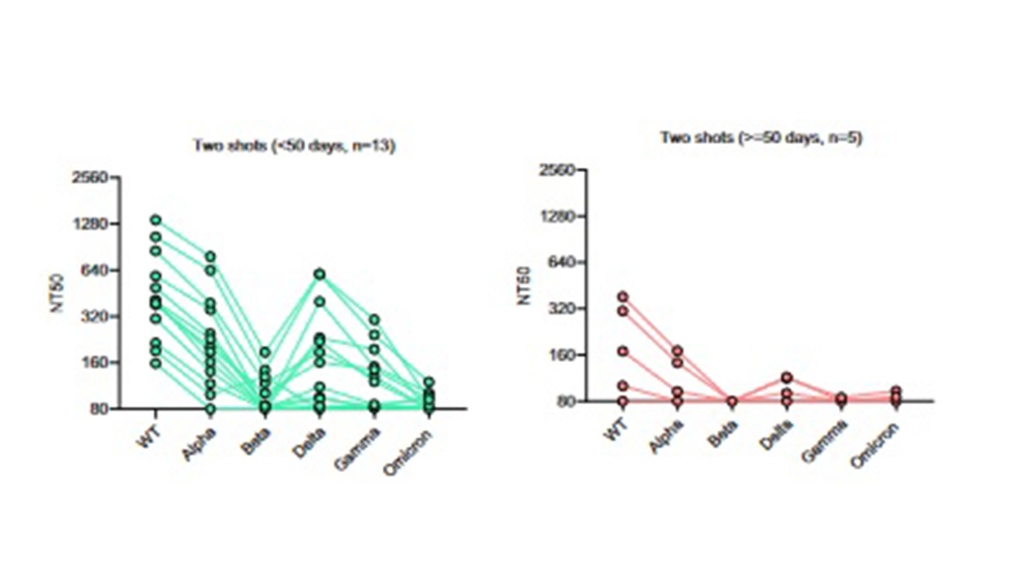COVID-19 infection before 2022 offers little protection against new variants, study finds
Vaccination or recovery from a COVID-19 infection prior to 2022 provides little or no protection from getting infected again in the Omicron era, a new study completed largely by Toronto researchers found.
The group used blood samples from hospitalized COVID-19 patients to develop a new modular, adaptable blood test known as NEU-SATiN.
They compared it to several other more expensive, slower, established tests and found it could accurately detect the concentration of neutralizing antibodies in blood, regardless of which variant the patient was infected with, in 30 minutes or less.
But it showed the antibodies generated from vaccination or recovery from Alpha or Delta variants circulating prior to 2022 barely register against Omicron.
“What it says if you had a natural infection or were vaccinated, you are likely protected against the variant you had,” study contributor Dr. Shawn Owen from the University of Utah told CP24. “But what it also says is that it doesn’t give you protection either way for later strains, especially the Omicron variant.”
The test could detect medically significant levels of neutralizing antibodies in vaccinated or recovered patients, even more than fifty days after receipt of their last dose.

Researchers took those samples and compared them to samples of Omicron-infected patients collected later on and found “almost all samples” of blood from infected patients “were ineffective at neutralizing the Omicron variants.
“Our results also suggest that prior infection/vaccination does not provide significant neutralizing protection against the (Omicron) variant,” study authors wrote.
The new test detects the level of neutralizing antibodies developed against SARS-COV-2 post-infection, using commonly available lab implements, and it can be adjusted to detect each new variant that emerges.
Owen said the test is built in such a way that one can make a new version of it for “each one of the variants” that emerges and becomes dominant.
He said that the study also found that there are advantages to acquiring immunity, even for a short period of time, through vaccination rather than recovery from infection.
“It also says that you can get protection from becoming infected but you’re going to get sick in order to do that. So a vaccine is probably a better choice to avoid that and get the same protection.”
Even with the study’s findings, infectious diseases specialist Dr. Isaac Bogoch says that neutralizing antibodies are only one part of the body’s immune system.
“We’ve got multiple arms and multiple branches of our immune system to protect us against COVID-19, especially in those people who are vaccinated and up to date with their vaccination and of course even in people who have been infected and have recovered from infection, so it’s not like this puts us back to square one whatsoever”
He said that there is other research and a host of real-world observations that find vaccination is still very effective at preventing severe outcomes such as death or hospitalization in the Omicron era.
“They do a remarkably good job of protecting people from severe infections involving hospitalization and death, but yes, of course we know that with this BA.5 variant versus other variants, it can chip away at some of the immunity we have built up. It can cause reinfections.”
Ontario health officials have said that the BA.5 Omicron subvariant, which is believed to be even more infectious than previous strains, now accounts for more than 60 per cent of all infections in the province and is driving a new wave of the pandemic.
CTVNews.ca Top Stories

Alleged gang member driving from U.S. arrested at Canadian border after making wrong turn
An alleged gang member coming from the United States was arrested at the Canadian border after reportedly making a wrong turn onto the Peace Bridge border crossing.
Negotiations between Canada Post, union still on hold
Canada Post says it's waiting for a response from the union representing some 55,000 striking workers after it offered a new framework for negotiations over the weekend.
Trump demands immediate release of Oct. 7 hostages, says otherwise there will be 'HELL TO PAY'
President-elect Donald Trump is demanding the immediate release of the Israeli hostages still being held in Gaza, saying that if they are not freed before he is sworn into office there will be “HELL TO PAY."
Kingston, Ont. doctor ordered to repay $600K for pandemic vaccination payments
An Ontario health tribunal has ordered a Kingston, Ont. doctor to repay over $600,000 to the Ontario government for improperly billing thousands of COVID-19 vaccinations at the height of the pandemic.
Nova Scotia lawyer suspended following ugly courtroom fracas
A Nova Scotia lawyer who had to be restrained by deputy sheriffs during a court appearance earlier this year has lost his appeal of a suspension following the bizarre incident.
After multiple data breaches, Yahoo settled a class-action lawsuit. The deadline to file compensation claims is approaching
Yahoo and Rogers customers in Canada have until the end of the month to claim up to $375 cash from a data breach settlement.
AC/DC announces North American stadium tour, Vancouver lone Canadian stop
Big news for AC/DC fans as the heavy metal bigwigs announced Monday they will hit the road next spring. But as of now, there’s only one Canadian show on the docket.
Wind chills of -50, snowfall of up to 50 cm: Canada's weather forecast
As the second day of December unfolds, Canadians from coast to coast are experiencing a range of wintry conditions. Here's what's happening in different parts of the country.
Neighbours who sheared tops of B.C. man's bamboo plants ordered to pay $1K in damages
A B.C. man whose neighbours lopped the tops off of four of his bamboo plants has been awarded $1,000 in damages by the province’s Civil Resolution Tribunal.































